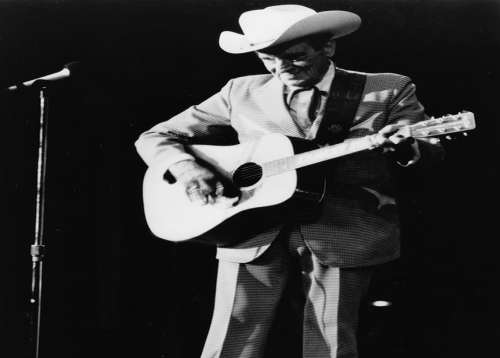TUBB, ERNEST DALE (1914-1984).
Ernest Tubb, singer, was born in Crisp, Texas, on February 9, 1914, the son of Calvin and Ellen Tubb. He was reared by other relatives in Ellis County. As a teenager, Tubb took a job in San Antonio as a soda jerk, learned the guitar on his own, and landed an unpaid job at KONO radio station. During this time Tubb was befriended by Carrie Rodgers, widow of James Charles (Jimmie) Rodgers,qv a major influence on Tubb's singing. She helped Tubb obtain a recording contract with RCA Victor in 1936. In 1940 Tubb signed with Decca Records and began commercially promoting himself and his records through association with a flour company. Known as "The Gold Chain Troubador," Tubb was only earning $75 a week in salary and not selling many records. He was almost ready to leave the music scene and take a job in the defense industry when he recorded "Walking the Floor Over You," a million record seller that paved the way to Hollywood. Tubb made several movies, joined the Grand Ole Opry in 1943, and remained a regular performer there for over forty years. With his band, the Texas Troubadors, Tubb began a performance schedule that would eventually take a serious toll on his health and his personal life as well. He was married to Lois Elaine Cook on May 26, 1934; they were divorced in 1948, a year when Tubb had three songs on the Billboard top-ten charts. By 1949 the hits numbered seven: "Blue Christmas," "Don't Rob Another Man's Castle," "Have You Ever Been Lonely," "I'm Bitin' My Fingernails and Thinking of You," "Slipping Around," "Tennessee Border No. 2," and "Warm Red Wine." He married Olene Adams Carter ("My Tennessee Baby") in June 1949. They had five children. During his career Ernest Tubb recorded more than 250 songs and sold 30 million records. He was elected to the Country Music Hall of Fame in 1965. He owned a record store in Nashville and was known for his generosity to unknown artists who would later become famous, including Hank Williams, Hank Snow, and Loretta Lynn. As a singer, Tubb was unique but not necessarily great, perhaps because of his change in voice from the tenor yodels of Jimmie Rodgers to a granite baritone not always on key. "I don't care whether I hit the right note or not. I'm not looking for perfection of delivery-thousands of singers have that. I'm looking for individuality," he told an interviewer. A Tubb concert or dance in his later years would include "Waltz Across Texas," "There's a Little Bit of Texas," "Filipino Baby," "Let's Turn Back the Years," "Little Ole Band of Gold," and "Thanks (Thanks a Lot)." He traveled in a customized bus and always ended a performance by flipping his insignia, THANKS, on the back side of his guitar. His fan club was in attendance in most Texas cities, and Tubb knew many families personally. "To me, country music is from your heart and soul. It's your LIFE," he said in 1980. He was often credited with the electric amplification of instruments, which he was not the first to try, but when he did go electric he soon personified the folksy and rowdy music, known as Texas honky-tonk, that was beginning to sell records and attract people to dance halls in the 1940s. He seldom varied from a basic ensemble for his touring band, which always featured guitars. "Keep it low to the ground," he would tell the band, and he delivered all the vocals. He never appeared in public without a tailored Western suit and ten gallon hat, a feature that properly credits Tubb with erasing the "Hillbilly" term from its earlier associations with "Country" and "Western." He has been credited as being a major influence to both his musical peers and younger players. He played himself in the 1980 movie Coal Miner's Daughter. Tubb died on September 6, 1984, in Nashville, and was buried in Hermitage Memorial Gardens.
BIBLIOGRAPHY: Austin American-Statesman, September 7, 1984. Bill C. Malone, Country Music U.S.A. (Austin: University of Texas Press, 1968). Irwin Stambler and Grelun Landon, Encyclopedia of Folk, Country and Western Music (New York: St. Martin's, 1969; 2d. ed., 1983). Vertical Files, Barker Texas History Center, University of Texas at Austin.
Phillip L. Fry
| Date |
Venue |
City |
State |
Note |
| No Tour Dates Available |

